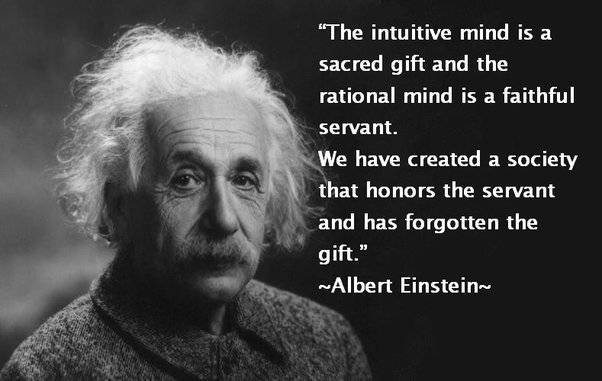Gut feeling is a term that is often used to describe an intuition or instinctual response that we experience without thinking it through. It has been described as a sudden sensation, a feeling of unease or even as an inner voice that guides us towards making certain choices.
Many of us have experienced this sensation at some point in our lives, whether it be in relation to our personal relationships or when making important decisions. Despite being difficult to define and explain, gut feeling is thought to be an important aspect of decision-making.
At times, the rational mind may not provide the answers that we seek, and in such cases, listening to our intuition can help guide us towards making the right choice. But what exactly is gut feeling?
How does it arise? And why should we pay attention to it?

Definition of Gut Feeling
Gut feeling can be defined as an instinctual response that occurs without conscious thought or reasoning. It is often described as a “hunch” or “intuition” and can manifest itself through physical sensations such as discomfort, tension or unease.
The concept of gut feeling dates back centuries and was first described by philosophers such as Aristotle who believed that there was a connection between the mind and body. Today, researchers believe that gut feeling arises from the interaction between different parts of the brain and nervous system.
With recent advances in neuroscience, scientists are beginning to understand more about how gut feeling works and how it impacts our behavior and decision-making. However, despite these advancements, there remains much unknown about this phenomenon.
Importance of Gut Feeling in Decision Making
When faced with complex decisions, many people rely on rational thinking or analytical processes to make informed choices. While these methods can certainly provide valuable insights into potential outcomes, they are not always foolproof.
In contrast, listening to our gut feelings can offer us a different perspective, one that takes into account our emotional responses and unconscious biases. Our intuition can often sense things that our rational minds cannot, giving us insight into potential risks or opportunities.
The importance of gut feeling in decision-making is especially relevant in fast-paced environments where we may not have the luxury of time to analyze every option. By tuning into our instincts and trusting ourselves, we can make quicker and more informed decisions.
In the following sections of this article, we will explore the science behind gut feeling, how to trust your intuition and its impact on business and personal relationships. We will also look at examples of when ignoring our instincts has led to negative consequences and how to avoid doing so in the future.
The Science Behind Gut Feeling
The Role of the Brain and Nervous System in Gut Feeling
Gut feeling is a sensation that originates from the gut and is felt in the body, but its source is still rooted in the brain and nervous system. The gut-brain axis, a network of neurons linking the brain to the gastrointestinal system, plays an essential role in transmitting signals between these two organs. The vagus nerve, which connects the two systems, also plays a vital role in this communication pathway.
The enteric nervous system (ENS), which is often referred to as “the second brain,” consists of millions of neurons located within the walls of our gastrointestinal tract that help regulate digestion. These neurons can communicate with both the central nervous system (CNS) and peripheral nervous system (PNS).
The ENS can also function independently without input from other parts of our body. This connection between our gut and brain provides evidence that there may be more validity to trusting your gut feeling than previously thought.
How Emotions Influence Gut Feeling
Our emotions play a crucial role in gut feeling. Emotions are often felt as physical sensations within our bodies; anger makes our heart rate increase, fear makes us shaky or sweaty, and joy makes us feel like we’re floating on air. These physical sensations are caused by neurotransmitters that send signals throughout our bodies to different organs – including our gut.
Studies show that emotions directly affect our digestive processes by influencing gut motility, secretion of digestive enzymes and acid production. When we’re anxious or stressed out about something important, this can lead to irregularity such as diarrhea or constipation.
The Connection Between Intuition and Gut Feeling
Intuition refers to an individual’s ability to sense something without any logical explanation or conscious reasoning. There’s no doubt that intuition exists because it has been observed in many different forms, such as a sudden feeling that something is off or an urge to take action.
The question is, how does intuition relate to gut feeling? Intuition and gut feeling are interconnected because the gut has millions of neurons that communicate with the brain via the vagus nerve.
This communication pathway is responsible for sending signals from the gastrointestinal tract to the brain, which can elicit emotional responses and intuitive insights. It’s through this interaction that we may be able to better understand how our gut feelings arise – whether it’s due to a bodily sensation or an innate sense of knowing something without conscious reasoning.
Trusting Your Gut Feeling
Recognizing when your gut feeling is speaking to you
Have you ever had a sudden feeling that something wasn’t right or that you should take a certain action? This could be your gut feeling trying to communicate with you.
Gut feeling can manifest as a physical sensation in the body, such as tightness in the chest or butterflies in the stomach. It can also come through as an inner voice or intuition.
However, it’s important to learn how to recognize when your gut feeling is speaking to you. One way is to pay attention to your body’s physical responses.
For example, if you’re considering a decision and suddenly feel anxious or tense, this could be a sign that something isn’t right. Similarly, if you feel excited and energized about an opportunity, this could be a sign that it’s worth pursuing.
Understanding the difference between fear and intuition
It can sometimes be challenging to distinguish between fear and intuition when making decisions based on gut feeling. Fear tends to come from negative experiences we’ve had in the past and can hold us back from taking risks or pursuing new opportunities.
Intuition, on the other hand, comes from within us and guides us towards actions that align with our true selves. To understand whether it’s fear or intuition driving your gut feeling, ask yourself whether there are any past traumas or negative experiences influencing your decision-making process.
If so, try to separate those feelings from what your inner voice is telling you. Another helpful tip is to reflect on whether the decision aligns with your values and long-term goals.
Tips for trusting your gut feeling in decision making
Trusting your gut feeling can sometimes feel scary because it means going against logic and reasoning. However, listening to our inner voice can lead us towards fulfilling our purpose and finding true happiness. Here are some tips for trusting your gut feeling in decision making:
1. Practice mindfulness: Take time to quiet your mind and tune into your body’s physical sensations when making decisions.
2. Start small: Trusting your gut feeling is like a muscle – the more you use it, the stronger it becomes. Start with small decisions and work your way up to larger ones.
3. Reflect on past experiences: Look back at times when you trusted your intuition and it paid off. This can help build confidence in future decision making.
4. Seek support: Talk to friends, family, or a therapist about your decision-making process. Sometimes getting an outside perspective can help validate our gut feeling.
By recognizing when our gut feeling is speaking to us, understanding the difference between fear and intuition, and following these tips for trusting our inner voice in decision making, we can live a more fulfilled and purposeful life.
Gut Feeling in Business
How successful business leaders use their intuition for decision making
Successful business leaders understand that data and analytics are crucial for making informed decisions. However, relying solely on data-driven decisions can lead to missed opportunities or even failure.
That’s where gut feeling comes in. Intuitive insights can provide valuable information that is not available through data analysis alone.
By tapping into their gut feelings, successful business leaders are able to make decisions with a more holistic view of the situation at hand. They may rely on their instincts to assess risks and opportunities, evaluate potential outcomes, or judge people’s characters.
Steve Jobs, the co-founder of Apple, was known for relying on his intuition for decision making. He famously said: “You have to trust that the dots will somehow connect in your future.” By following his instincts and pursuing what he believed in, Jobs built one of the most successful companies in history.
Examples of companies that have relied on their instincts for success
Many successful companies have relied on gut feeling alongside data-driven decision-making processes. One example is Amazon.
The company has made a priority of collecting and analyzing customer data to improve its services and offerings. However, founder Jeff Bezos has also emphasized the importance of intuition when it comes to making big bets.
Amazon’s acquisition of Whole Foods is a prime example of how gut feeling played a crucial role in decision-making process. The deal was largely driven by Bezos’s intuition rather than financial projections or market research alone.
Another example is Zara, a Spanish clothing retailer known for its fast fashion approach to design and production. Zara’s founder Amancio Ortega has credited much of the company’s success to his own intuitive sense about what customers want.
Balancing Data-Driven Decisions with Intuitive Insights
While gut feeling can be a valuable tool in decision-making, it’s important to strike a balance with data-driven decisions. A Harvard Business Review study found that companies that make decisions based on both data and intuition outperform those that rely solely on one or the other.
To achieve this balance, businesses need to create an environment where intuition is valued as much as data. This means fostering a culture of experimentalism and risk-taking, where employees are encouraged to voice their gut feelings and test their ideas with data.
Businesses can also use tools like scenario planning or “what-if” analyses to test the outcomes of different intuitive and data-driven decisions. By doing so, they can assess the potential risks and rewards of both approaches before making a final decision.
While gut feeling may not be quantifiable or objective like data analysis, it provides valuable insights that cannot be obtained through numbers alone. Business leaders who learn to trust their instincts while also utilizing analytics are more likely to make successful and informed decisions.
Gut Feeling in Relationships
How Intuition Can Guide Us Towards Healthy Relationships
Our gut feeling is not only useful when it comes to decision making, but it can also be a valuable tool in our relationships. In fact, many successful couples attribute their success to following their intuition.
When we listen to our instincts and tune into our feelings, we are able to recognize when something feels off or when we are on the right track. Intuition often guides us towards people who are aligned with our values and goals.
It may alert us to red flags that indicate someone is not trustworthy or compatible with us. Gut feeling helps us see beyond superficial qualities like looks or status and connect with people who make us feel seen and understood.
The Importance of Listening to Our Instincts When It Comes to People We Meet
Have you ever met someone and immediately felt uneasy around them, even though they seemed charming on the surface? Or have you ever been drawn towards someone despite their flaws?
These initial reactions are often based on instinctual feelings that we should pay attention to. When it comes to meeting new people, whether they be romantic partners or just friends, our gut feeling can help guide us towards positive connections.
By trusting our instincts from the beginning, we can avoid getting involved in toxic relationships that drain our energy and leave us feeling unfulfilled. It’s important that we give ourselves permission to trust what feels right for us rather than relying solely on external factors.
Trusting Our Own Feelings Over Outside Opinions
Our gut feeling should be trusted over outside opinions when it comes to choosing partners or making relationship decisions because only we know what truly feels right for ourselves. Oftentimes, friends and family may give advice based on their own biases or experiences that don’t necessarily apply to our situation.
While seeking opinions from others can be helpful, it’s important to remember that we know ourselves best and our gut feeling is a valuable tool in decision making. When we trust our instincts, we are able to make decisions that align with our values and lead us towards genuine connections with others.
The Dark Side of Ignoring Your Gut Feeling
How Ignoring Your Instincts Can Lead to Negative Consequences
The human brain is highly complex and is wired for survival. One of the ways it does this is by sending signals through our gut, otherwise known as the enteric nervous system.
When we experience a gut feeling, it’s often based on our subconscious picking up on subtle cues that we may not be aware of on a conscious level. Ignoring your gut feeling can have negative consequences, as it means you’re ignoring your body’s natural warning system.
This can lead to bad decisions, missed opportunities and even danger in some cases. For example, if you’re walking down a dark alley at night and suddenly feel a sense of unease in your stomach, that’s your body telling you to be alert and aware of potential threats.
Examples from History Where Ignoring Intuition Led to Disaster
There are many examples from history where ignoring intuition led to disaster. One such example is the sinking of the Titanic in 1912. Despite numerous warnings about icebergs ahead, the captain and crew remained complacent and ignored their instincts to slow down or change course.
As a result, over 1,500 people lost their lives. Another example is the Challenger space shuttle disaster in 1986.
Engineers working on the project had expressed concerns about potential flaws with certain components but these were ignored by management who were under pressure to stick to strict schedules. The shuttle ultimately exploded shortly after launch killing all seven crew members.
How to Avoid Ignoring Your Instincts
Trust your gut feeling but also verify with data when possible! It’s important not to rely solely on intuition when making important decisions; instead use both evidence-based information and intuitive insights together. Take time for reflection before making major life choices.
This can include meditation or journaling to help you slow down and tune into your inner voice. Work on cultivating self-awareness.
This means taking time to understand your own strengths, weaknesses, values and beliefs. The more you know about yourself, the better equipped you are to make decisions that align with your goals and values.
Ignoring your gut feeling can have negative consequences and it’s important to listen to those subtle signals from the body that can protect us from danger or guide us towards success. By working on self-awareness and using both intuition and evidence-based information together, we can make better decisions that lead to positive outcomes.
Final Thoughts on the Importance of Listening to Our Intuition
Ultimately, trusting our gut feeling requires practice and self-reflection. It can be challenging to differentiate between intuition and other emotions such as fear or anxiety.
However, by paying attention to the physical sensations we experience when making decisions, we can learn to recognize when our intuition is speaking. The benefits of listening to our intuition cannot be overstated.
By tapping into this innate sense of knowing, we can make better choices that align with our values and goals. So the next time you are faced with a difficult decision or situation where you feel unsure about what course of action to take – remember that your gut feeling may hold the key!
20 Quotes on intuition and gut feeling:
- “Trust your hunches. They’re usually based on facts filed away just below the conscious level.” – Dr. Joyce Brothers
- “Your time is limited, don’t waste it living someone else’s life. Don’t be trapped by dogma, which is living the result of other people’s thinking. Don’t let the noise of other’s opinion drown your own inner voice. And most important, have the courage to follow your heart and intuition, they somehow already know what you truly want to become. Everything else is secondary.” – Steve Jobs
- “Intuition is the whisper of the soul.” – Jiddu Krishnamurti
- “The only real valuable thing is intuition.” – Albert Einstein
- “Trust your instincts. Intuition doesn’t lie.” – Oprah Winfrey
- “Intuition is seeing with the soul.” – Dean Koontz
- “Listen to your intuition. It will tell you everything you need to know.” – Anthony J. D’Angelo
- “Follow your instincts. That’s where true wisdom manifests itself.” – Oprah Winfrey
- “Intuition comes very close to clairvoyance; it appears to be the extrasensory perception of reality.” – Alexis Carrel
- “Trust yourself. You know more than you think you do.” – Benjamin Spock
- “Intuition is a very powerful thing, more powerful than intellect, in my opinion.” – Steve Jobs
- “Trust your own instincts, go inside, follow your heart. Right from the start. go ahead and stand up for what you believe in. As I’ve learned, that’s the path to happiness.” – Lesley Ann Warren
- “You must train your intuition. You must trust the small voice inside which tells you exactly what to say, what to decide.” – Ingrid Bergman
- “Intuition is really a sudden immersion of the soul into the universal current of life.” – Paulo Coelho
- “At times you have to leave the city of your comfort and go into the wilderness of your intuition. What you’ll discover will be wonderful. What you’ll discover is yourself.” – Alan Alda
- “Intuition will tell the thinking mind where to look next.” – Jonas Salk
- “The intuitive mind is a sacred gift and the rational mind is a faithful servant. We have created a society that honors the servant and has forgotten the gift.” – Albert Einstein
- “Intuition is the key to everything, in painting, filmmaking, business – everything. I think you could have an intellectual ability, but if you can sharpen your intuition, which they say is emotion and intellect joining together, then a knowingness occurs.” – David Lynch
- “A woman uses her intelligence to find reasons to support her intuition.” – Gilbert K. Chesterton
- “Your intuition knows what to write, so get out of the way.” – Ray Bradbury
These quotes emphasize the power and importance of intuition and trusting one’s gut feelings.
20 affirmations that may help you trust your intuition and gut feelings more:
- “I trust my inner voice. It guides me towards the right decisions.”
- “I am open and receptive to my inner wisdom.”
- “My intuition is strong and leads me down the right path.”
- “I trust the divine guidance that my intuition brings.”
- “I am in touch with my gut feelings and they help me make the best decisions.”
- “I am tuned in to the subtle energy of the world around me.”
- “I listen to my intuition, it knows the way.”
- “My instincts are clear and guide me effectively.”
- “My intuitive sense grows stronger each day.”
- “My trust in my gut feelings empowers me.”
- “I am deeply connected with my higher self, which guides my intuition.”
- “I am led by the insights that my intuition offers me.”
- “I believe in the power of my inner wisdom.”
- “I follow my instincts, and they lead me to joy and success.”
- “I honor the intuitive messages from my body and mind.”
- “I always have access to my inner guidance.”
- “My intuition knows what is best for me.”
- “I trust in the process and believe in my intuitive senses.”
- “I am at peace because I trust my intuition.”
- “Everyday my intuition becomes stronger and my understanding deeper.”
Remember, affirmations are more effective when repeated regularly. Consider choosing a few of these that resonate most strongly with you and incorporating them into a daily routine. You may find that it helps strengthen your intuition and trust in your gut feelings over time.




























































